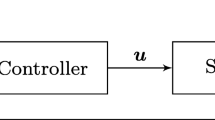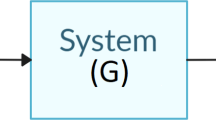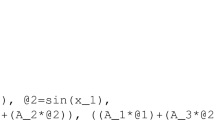Abstract
This paper introduces a new approach to robust model predictive control (MPC) based on conservative approximations to semi-infinite optimization using linear matrix inequalities (LMIs). The method applies to problems with convex quadratic costs, linear and convex quadratic constraints, and linear predictive models with bounded uncertainty. If the MPC optimization problem is feasible at the initial control step (the first application of the MPC optimization), it is shown that the MPC optimization problems will be feasible at all future time steps and that the controlled system will be closed-loop stable. The method is illustrated with a solenoid control example.
Similar content being viewed by others
References
E. F. Camacho C. Bordons (1995) Model Predictive Control in the Process Industry Springer Verlag New York, NY
M. Morari J. H. Lee (1999) ArticleTitleModel Predictive Control: Past, Present, and Future Computers and Chemical Engineering 23 667–682 Occurrence Handle10.1016/S0098-1354(98)00301-9
S. J. Qin T. A. Badgwell (2000) An Overview of Nonlinear Model Predictive Control Applications F. Allgwer A. Zhang (Eds) Nonlinear Model Predictive Control Birkhauser, Basel Switzerland 369–393
J. B. Rawlings (2000) ArticleTitleTutorial Overview of Model Predictive Control IEEE Control System Magazine 20 38–52
H. Genceli M. Nikolaou (1993) ArticleTitleRobust Stability Analysis of Constrained-Norm Model Predictive Control Journal of AIChE 39 1954–1965 Occurrence Handle1247764
M. V. Kothare V. Balakrishnan M. Morari (1996) ArticleTitleRobust Constrained Model Predictive Control Using Matrix Inequalities Automatica 32 1361–1379 Occurrence Handle10.1016/0005-1098(96)00063-5 Occurrence Handle1420038 Occurrence Handle0897.93023
P. O. M. Scokaert D. Q. Mayne (1998) ArticleTitleMin-Max Feedback Model Predictive Control for Constrained Linear Systems IEEE Transactions on Automatic Control 43 1136–1142 Occurrence Handle1636467 Occurrence Handle0957.93034
Zhang, Z. Q., and Morari, M., Robust Stability of Constrained Model Predictive Control, Proceedings of the American Control Conference, pp. 379–383, 1993.
Bemporad, A., Reducing Conservativeness in Predictive Control of Constrained Systems with Disturbances, Proceedings of the 37th IEEE Conference on Decision and Control, pp. 1384–1389, 1998.
Jia, D., and Krogh, B. H., Min-Max Feedback Model Predictive Control for Distributed Control with Communuication, Proceedings of the American Control Conference, pp. 4507–4512, 2002.
E. Polak (1997) Optimization: Algorithms and Consistent Approximation Springer Verlag New York, NY Occurrence Handle0899.90148
L. Vandenberghe S. Boyd (1998) Connections between Semi-Infinite and Semidefinite Programming R. Reemtsen J. J. Rueckmann (Eds) Semi-Infinite Programming Kluwer Academic Publishers Dordrecht, Netherlands 277–294
M. J. Todd (2001) ArticleTitleSemidefinite Optimization Acta Numerica 10 515–560 Occurrence Handle2009698 Occurrence Handle10.1017/S0962492901000071 Occurrence Handle1105.65334
L. Vandenberghe S. Boyd (1996) ArticleTitleSemidefinite Programming SIAM Review 38 49–95 Occurrence Handle10.1137/1038003 Occurrence Handle1379041 Occurrence Handle0845.65023
S. Boyd L. El Ghaoul E. Feron V. Balakrishnan (1994) Linear Matrix Inequalities in System and Control Theory Society for Industrial and Applied Mathematics Philadelphia, Pennsylvania Occurrence Handle0816.93004
F. Blanchini (1999) ArticleTitleSet Invariance in Control Automatica 35 1747–1767 Occurrence Handle0935.93005 Occurrence Handle1831764
Jia, D., Distributed Coordination in Multi-Agent Control Systems through Model Predictive Control, PhD Thesis, Department of Electrical and Computer Engineering, Carnegie Mellon University, 2003.
B. Kouvaritakis J. A. Rossiter J. Schuurmans (2000) ArticleTitleEfficient Robust Predictive Control IEEE Transactions on Automatic Control 45 1545–1549 Occurrence Handle10.1109/9.871769 Occurrence Handle1797413 Occurrence Handle0988.93022
Loefberg, J., Minimax Approaches to Robust Model Predictive Control, PhD Thesis, Department of Electrical Engineering, Linkoeping University, 2003.
Author information
Authors and Affiliations
Additional information
Communicated by Q. C. Zhao
The authors thank the anonymous reviewers for suggestions that improved the presentation of this work. The work was supported in part by the EPRI/DoD Complex Interactive Networks/Systems Initiative under Contract EPRI-W08333-05 and by the US Army Research Office Contract DAAD19-01-1-0485.
Rights and permissions
About this article
Cite this article
Jia, D., Krogh, B.H. & Stursberg, O. LMI Approach to Robust Model Predictive Control. J Optim Theory Appl 127, 347–365 (2005). https://doi.org/10.1007/s10957-005-6549-2
Issue Date:
DOI: https://doi.org/10.1007/s10957-005-6549-2




